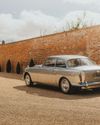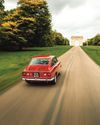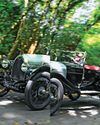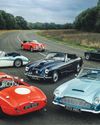
Post-war America was a time of unbridled optimism. After WW2, with most of Europe and much of Asia lying devastated, the United States emerged as the world's first superpower.
It was an era during which America's middle class also fully developed, driven by many returning veterans taking advantage of the GI Bill to attend college (the first generation to do so for most) and buy their first house. Those starter homes of 1000sq ft or less often had attached garages. Their new owners, having made sacrifices during the war years, were eager to park a shiny new US-built automobile inside.
The remaining independent makers - such as Nash, Studebaker, Packard, Hudson, KaiserFrazer and more - were the first to introduce all-new models before 1948. But in 1949, the Big Three General Motors, Ford and Chrysler countered. These new cars looked nothing like their warmed-over, pre-war-rooted '48 models. The Big Three offered restyles every year, and planned obsolescence motivated hungry buyers to purchase a new car every other year. America's consumer economy was truly born, and it propelled the country through decades of unprecedented growth and expansion.
With this as a background, and with a brief slowdown for the 1950-'53 Korean conflict, the Big Three embarked on a brutal price war, and caught in the crossfire were the independents. Chrysler was the weakest of the market leaders, but as an engineering-focused company it introduced the legendary first-generation Hemi V8. At Ford, a massive reorganisation was happening in the aftermath of near-bankruptcy in the 1940s. This resurgence was led by founder Henry Ford's son, Henry II, known as The Deuce, and a group of senior managers, called the Whiz Kids, led by Robert McNamara.
Diese Geschichte stammt aus der November 2024-Ausgabe von Classic & Sports Car.
Starten Sie Ihre 7-tägige kostenlose Testversion von Magzter GOLD, um auf Tausende kuratierte Premium-Storys sowie über 8.000 Zeitschriften und Zeitungen zuzugreifen.
Bereits Abonnent ? Anmelden
Diese Geschichte stammt aus der November 2024-Ausgabe von Classic & Sports Car.
Starten Sie Ihre 7-tägige kostenlose Testversion von Magzter GOLD, um auf Tausende kuratierte Premium-Storys sowie über 8.000 Zeitschriften und Zeitungen zuzugreifen.
Bereits Abonnent? Anmelden

RAY HILLIER
Double-chevron oddity proves a break from the norm for this Crewe specialist

SHORT BACK & GLIDES
Eccentric enthusiast Captain RG McLeod's series of Manx-tailed Bentley Specials reached its zenith with this unique S2 Continental.

People's choice
The diminutive but multi-million-selling Fiat 850 packed a remarkable diversity of form and function into its compact footprint

PLASTIC BREAKS FROM THE NORM
Glassfibre revolutionised niche car-body production, but just occasionally strayed into the mainstream.

A SENSIBLE SUPERCAR
The cleverly conceived four-seater Elite secured Lotus a place at the big players' table, but has it been unfairly maligned since then?

"I had a habit of grabbing second place from the jaws of victory"
From dreams of yachting glory to the Le Mans podium, via a stint at the top of the motorsport tree, Howden Ganley had quite the career

Still going strong
Herbert Engineering staked its reputation on the five-year warranty that came with its cars. A century on, this Two Litre hasn't made a claim

One for the kids
General Motors was aiming squarely at the youth market with the launch of the Pontiac GTO 60 years ago, and its runaway success popularised the muscle-car movement

A NEW BREED OF HERO
Launched at the turn of the millennium, the GT3 badge has already earned a place alongside RS, CS and turbo in Porsche lore.

Brits with SIX appeal
The straight-six engine is synonymous with a decades-long legacy of great British sports cars. Six variations on the sextet theme convene for comparison